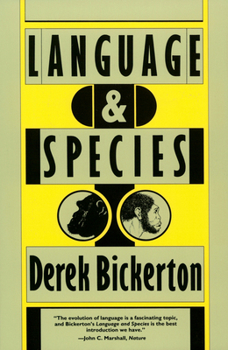Language and Species
Select Format
Select Condition 
Book Overview
Language and Species presents the most detailed and well-documented scenario to date of the origins of language. Drawing on "living linguistic fossils" such as "ape talk," the "two-word" stage of small children, and pidgin languages, and on recent discoveries in paleoanthropology, Bickerton shows how a primitive "protolanguage" could have offered Homo erectus a novel ecological niche. He goes on to demonstrate how this protolanguage...
Format:Paperback
Language:English
ISBN:0226046117
ISBN13:9780226046112
Release Date:April 1992
Publisher:University of Chicago Press
Length:305 Pages
Weight:0.04 lbs.
Dimensions:0.8" x 6.0" x 9.0"
Customer Reviews
2 ratings
If you smile at me I will understand because that is something everyone does in the same language
Published by Thriftbooks.com User , 17 years ago
If you smile at me I will understand because that is something that everyone does in the same language. David Crosby from the song "Wooden Ships" What songwriter David Crosby artfully offered in his song "Wooden Ships" Bickerton broadens in his thought provoking work Langauge and Species. Namely, Bickerton suggests that human language did not evolutionary just drop in out of the blue but rather evolved from other evolutionarily pre existing hominid and primate proto language systems. And honestly, the only problem with Bickerton's work is Noam Chomsky. At the outset of his book, Bickerton incorrectly asserts that Chomsky is the Isaac Newton of linguistics. As research progresses forward, it becomes more apparent that Chomsky is rather the Sigmund Freud of linguistics. This is because just like Freud, Chomsky was able to assert a comprehensive theory at just the right point in the development of a field that operated to at one in the same time stifle inquiry into or obfuscate the ability to discern the answers to important questions. And a big for instance of this stifling relates to the question of the origin of language...a point Chomsky has consistently opposed addressing. Another for instance is the slobbery regard Chomsky seems to have for the supposed uniqueness of human language. In this regard, hearing Chomsky describe the supposed uniqueness of human language is like hearing an elephant describe the uniqueness of its trunk. To be sure, there is a complexity to human language that seems lacking in other animal communication systems but again we can only say that the uniqueness seems lacking. Significantly, no one has succeeded in translating whale song, dolphin communication, or even bird song. It's very speciesist to say that because we cannot understand the language that other animals use it must be inferior in complexity to ours. Indeed what we do know is that certain shared facial patterns characterize common emotional states among mammals (from the half lided sleepy look to bared teeth aggressiveness). Why then should language be so of a kind different and so of a kind unique in kind rather than merely quality. Happily, it's Bickerton's sensitivity to these issues and his willingness to challenge Chomskian convention that makes this book significant for his courage to 1) posit a theory of language origins and 2) suggest that at the end of the day, maybe our language isn't really that far divorced from the pro language after all. To be sure, Bickerton's theory at the end of the day may be wrong. Like Greespan in The First Idea, Bickerton is eager to press into service the long discredited idea of ontogeny recapitulating philogeny. And his supposed examples of the similarity between his so called "ape speak" and the language of two year olds don't really support his supposed correspondences. However, all that is quite beside the point in a field that until only recently hasn't even bothered to consider the question o
One additional note...
Published by Thriftbooks.com User , 21 years ago
The review above is excellent, and I just wanted to add one point. Aside from language evolution, Bickerton makes one point that philosophers should be paying attention to. The question is how we get from sense perceptions to words, and Bertrand Russell for one got this wrong. He imagined that words map directly to sense perceptions, and got into huge philosophical trouble. The truth is apparently a bit more complex. We humans (and other beasts) have what might be called a "sensory subsystem," which senses the outside world and hands us a "concept." In the case of a frog, for example, the concept of "bug" produces appropriate catch-the-bug behavior. In the case of humans, the concept "bug" gets mapped onto the word for "bug" (which would be "malang" in Thai, "insecte" in French, etc.) So, in Bickerton's view, our words map to "concepts," which in turn map to sense perceptions. This may seem to be similar to quarreling over angels dancing on the head of a pin, but in fact it is a huge difference, and would be directly relevant to anyone who wanted (say) to make computers speak English.




